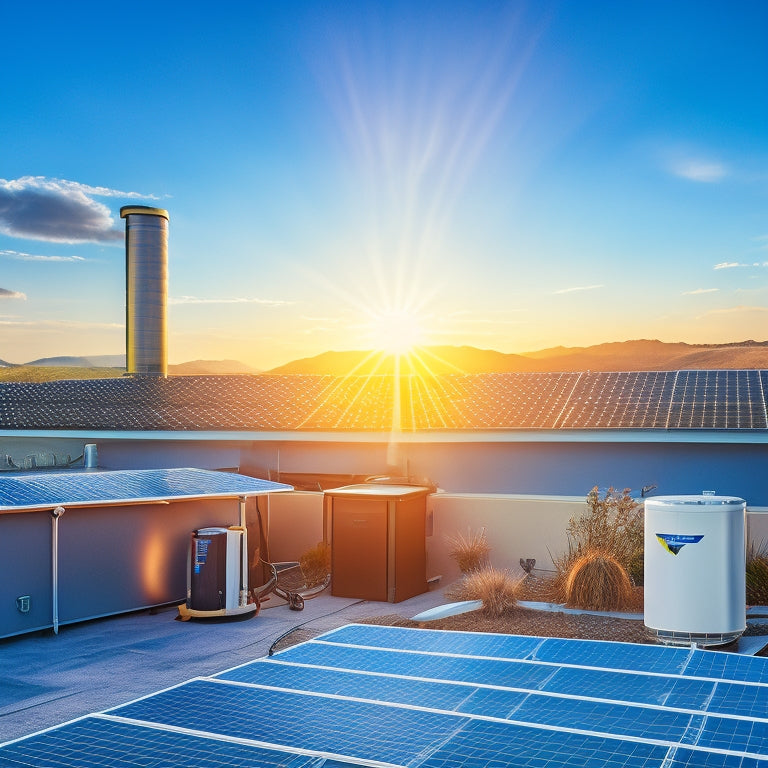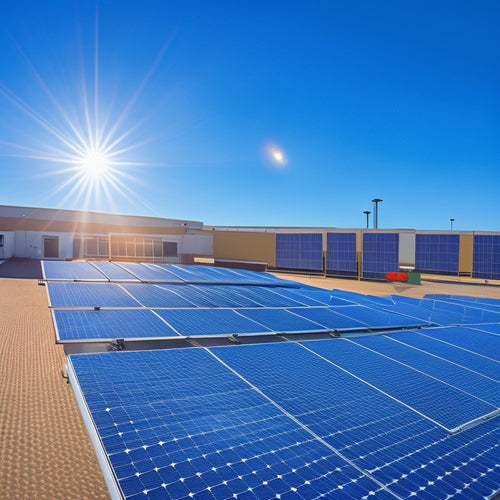
Cost of Solar Water Heaters Installation
Share
Installing a solar water heater usually costs between $3,000 and $8,000. This might seem steep, but consider the long-term benefits. You could save around $300 to $500 annually on energy bills, helping recoup your initial investment. Plus, tax incentives can further lower your costs. Higher efficiency in sunny regions enhances savings, while quality components guarantee durability and minimal maintenance. You'll also contribute to environmental preservation by reducing your carbon footprint. Assessing these factors, it makes sense to investigate your options further. Uncover more benefits that come with choosing solar water heating for your home.
At a Glance
- The initial investment for solar water heaters is offset by annual energy savings ranging from $300 to $500.
- Tax incentives and energy rebates can significantly lower out-of-pocket installation costs.
- Professional installation is essential to ensure system efficiency and compliance with local regulations.
- High-quality components improve longevity and decrease overall maintenance expenses over time.
- Local climate conditions and roof orientation affect installation costs and system performance efficiency.
Energy Savings Over Time
When you invest in a solar water heater, you're not just paying for installation; you're releasing significant long-term savings.
Solar power generators, with their cost-effective alternative to traditional energy sources, play an essential role in reducing overall energy expenditure.
Over time, you'll see reduced energy bills as your system utilizes the sun's power, allowing you to keep more money in your pocket.
This shift not only benefits your wallet but also contributes to a more sustainable future.
Long-term Savings Potential
Investing in a solar water heater can substantially reduce your energy bills over time, transforming a considerable upfront cost into long-term savings. With installation financing options available, you can manage the initial investment more easily.
Coupled with tax incentives and energy rebates, your out-of-pocket expenses can markedly decrease. The longevity of solar water heaters means you'll benefit from years of reduced maintenance costs compared to traditional systems.
With proper performance monitoring, you can guarantee your system operates efficiently, maximizing your savings. User testimonials often highlight the reliability and effectiveness of these systems, validating your decision.
Technology advancements continuously enhance solar water heaters, improving efficiency and performance. While potential drawbacks exist, like the need for adequate sunlight and initial costs, market trends show a growing preference for sustainable solutions.
More homeowners are recognizing the value of solar water heaters as a means to achieve energy independence and financial freedom. In the long run, the savings potential of a solar water heater far outweighs any initial concerns, making it a smart investment for those seeking to lower energy costs and adopt a sustainable lifestyle.
Reduced Energy Bills
How much can you really save on your energy bills with a solar water heater? The answer is significant. By utilizing the sun's energy, you can dramatically reduce your reliance on traditional energy sources, which translates to lower monthly utility costs.
On average, households can save anywhere from $300 to $500 annually, depending on usage and local energy rates. Over time, these savings add up, making your initial investment worthwhile.
Additionally, with various tax incentives available, you can further offset installation costs, enhancing your financial freedom. Many states and federal programs offer substantial rebates or credits, effectively lowering the overall expense of your solar water heater.
While it's true that maintenance costs exist, they're typically low compared to traditional water heating systems.
With regular check-ups and minimal repairs, you can keep your system running efficiently without breaking the bank.
Environmental Impact Reduction
By installing solar water heaters, you're greatly reducing your carbon footprint, as these systems rely on renewable energy rather than fossil fuels.
This shift not only helps combat climate change but also promotes a sustainable future for our planet.
Solar energy solutions contribute to cleaner environments and reduce reliance on traditional energy sources.
Embracing solar technology means you're making a conscious choice to protect the environment and employ resources that won't deplete over time.
Decreased Carbon Footprint
Why consider solar water heaters? By choosing this technology, you're not just making a smart financial decision; you're actively participating in carbon offset strategies that contribute to a healthier planet.
Solar water heaters utilize renewable energy from the sun, which greatly reduces your reliance on fossil fuels. This shift leads to a decreased carbon footprint, allowing you to align your lifestyle with sustainable living principles.
Imagine the impact of every gallon of hot water you generate without burning coal or natural gas. By simply installing a solar water heater, you're reducing greenhouse gas emissions and promoting a cleaner environment.
With the alarming rates of climate change, every action counts. You have the power to make choices that reflect your values and support freedom from environmental degradation.
Moreover, going solar isn't just about immediate benefits; it's an investment in a sustainable future. You'll contribute to a collective movement that prioritizes ecological balance and energy independence.
Seize this opportunity to enhance your lifestyle while championing the planet. When you opt for solar water heaters, you're not just saving money; you're creating a legacy of environmental stewardship for future generations.
Renewable Energy Utilization
Utilizing renewable energy through solar water heaters not only improves your home's efficiency but also greatly reduces environmental impact. By capturing the sun's energy, you're tapping into a sustainable resource that minimizes reliance on fossil fuels.
This change not only cuts down on greenhouse gas emissions but also promotes cleaner air and a healthier planet for future generations.
Thanks to recent solar technology advancements, solar water heaters are more efficient and affordable than ever. These innovations guarantee that you get the most out of your investment, often providing considerable energy savings over time.
In addition, many governments offer incentives to encourage the adoption of renewable energy solutions. These incentives can greatly offset the initial installation cost, making it easier for you to shift to solar energy and adopt a more sustainable lifestyle.
Key Components Overview
To successfully install a solar water heater, you need to understand its essential system components and the installation requirements involved. Each part plays a vital role in efficiency and performance, so knowing what to expect can save you time and money.
Additionally, considering energy storage solutions such as high-capacity batteries can enhance the overall effectiveness of your solar system. By grasping these key elements, you can make informed decisions that optimize your investment in solar technology.
Essential System Components
When considering the installation of solar water heaters, understanding the essential system components is crucial for maximizing efficiency and performance. The solar collector, often the heart of the system, absorbs sunlight and converts it into heat. Choosing a high-quality collector can greatly enhance your system efficiency, allowing you to utilize more energy from the sun.
Next, consider the storage tank. This component holds the heated water until you need it. Proper insulation is key to minimizing heat loss, which can save you money in the long run. Additionally, a well-designed tank reduces maintenance requirements by preventing corrosion and buildup.
Don't overlook the circulation system, which includes pumps and valves that move water between the collector and tank. An efficient circulation system guarantees that your heater operates smoothly, reducing the risk of mechanical failures.
Lastly, a controller regulates the entire process, optimizing performance based on sunlight availability. Investing in reliable components improves your system's longevity and reduces your overall maintenance efforts.
Installation Requirements Overview
Installing solar water heaters requires careful contemplation of several key components essential for a successful setup.
First, you'll need to evaluate your roof's suitability. It should have adequate space, face the right direction, and receive ample sunlight throughout the day.
Next, familiarize yourself with the installation guidelines specific to your area, as these can vary considerably based on local regulations and environmental conditions.
You can't overlook the importance of safety measures during installation. A secure mounting system is critical to withstand wind and weather conditions, while proper insulation minimizes heat loss.
Additionally, using high-quality materials will guarantee durability and efficiency, ultimately saving you money in the long run.
Don't forget to take into account plumbing and electrical requirements; these can complicate the installation process if not addressed upfront.
Seeking professional help might be wise to assure compliance with all guidelines and to avoid costly mistakes.
Selecting Based on Climate Conditions
When selecting a solar water heater, it's essential to take into account your local climate zone and how it impacts seasonal performance.
Different regions experience varying sunlight exposure and temperature fluctuations, which can greatly affect the efficiency of your system.
For instance, incorporating energy storage systems can enhance performance during low sunlight periods, ensuring a reliable hot water supply.
Climate Zone Considerations
Understanding climate zone considerations is essential for selecting the right solar water heater for your home. The climate you live in greatly affects both the system's efficiency and its installation costs. By matching your solar water heater to your region's climate conditions, you can enhance its performance and optimize energy savings, ultimately reducing your overall climate impact.
Here's a quick comparison of climate zones and their ideal solar water heater types:
| Climate Zone | Recommended Solar Water Heater Type |
|---|---|
| Hot and Arid | Evacuated Tube Collectors |
| Temperate | Flat Plate Collectors |
| Cold and Cloudy | Thermosiphon Systems |
When selecting a solar water heater, consider factors like the average temperature, sunlight exposure, and seasonal variations in your area. Investing in the right system can lead to long-term savings and efficiency. By understanding your climate zone, you can make an informed decision that aligns with your values of independence and sustainability, allowing you to utilize the power of the sun while minimizing your environmental footprint.
Seasonal Performance Variability
Considering the significant impact of seasonal changes on solar water heater performance, it's vital to select a system that can adapt to varying climate conditions throughout the year. When choosing a solar water heater, you should pay close attention to performance metrics that reflect its efficiency in different seasons.
For instance, systems with integrated seasonal adjustments can optimize energy capture during both sunny summers and overcast winters.
In colder climates, you may want to investigate systems with better insulation or antifreeze options to maintain performance levels year-round. Conversely, in warmer regions, a simpler design may suffice, as excessive heat can lead to inefficiencies.
It's important to assess how local weather patterns influence your potential savings and energy production. A well-informed choice based on your climate can maximize your investment and encourage a more sustainable lifestyle.
Higher Efficiency in Sunny Regions
If you're in a sunny region, you'll benefit considerably from the ideal sunlight exposure for solar water heaters.
The more direct sunlight your system receives, the higher its efficiency and energy output will be, leading to greater savings on your energy bills.
Investing in a solar water heater in these areas not only maximizes performance but also enhances your overall return on investment.
Optimal Sunlight Exposure
Ideal sunlight exposure plays an essential role in the efficiency of solar water heaters, especially in regions with abundant sunshine. If you're considering installation, understanding the solar angle and potential shading effects can notably impact your system's performance.
Maximizing sunlight can mean the difference between a reliable hot water supply and a lackluster system that fails to meet your needs. Here's a quick overview of how ideal sunlight exposure enhances efficiency:
| Aspect | Impact on Efficiency |
|---|---|
| Solar Angle | Correct angle maximizes absorption |
| Shading Effects | Minimized shading improves performance |
| Orientation | South-facing panels yield the best results |
| Seasonal Changes | Adjustments needed for winter |
| Maintenance | Regular checks enhance output |
In sunny regions, placing your solar water heater where it captures maximum sunlight without obstruction is vital. This not only guarantees you enjoy the freedom of hot water on demand but also maximizes energy savings. Investing time in proper positioning means you're not just installing a heater; you're embracing an eco-friendly lifestyle that liberates you from fluctuating energy costs.
Frequently Asked Questions
What Is the Average Installation Cost for Solar Water Heaters?
When considering solar water heaters, you'll find installation factors like system type and location affect the cost breakdown. Researching these elements helps you understand average expenses, ensuring you make an informed, enabled decision for your home.
Are There Any Government Incentives for Installing Solar Water Heaters?
You might not realize that federal rebates and state incentives can greatly reduce your solar water heater expenses. Exploring these opportunities could lead to substantial savings, enabling you to utilize renewable energy and enhance your freedom.
How Long Does the Installation Process Typically Take?
The installation timeline for solar water heaters typically ranges from one to three days, depending on installation factors like system complexity and site conditions. Understanding these factors helps you anticipate the process and plan effectively.
What Maintenance Is Required for Solar Water Heaters?
Maintaining your solar water heater isn't intimidating. Regular solar panel cleaning guarantees efficiency, while system performance monitoring helps you track output. With minimal effort, you'll enjoy sustainable energy freedom and reliable hot water year-round.
Can Solar Water Heaters Work in Cloudy or Rainy Climates?
Yes, solar water heaters can function in cloudy or rainy climates, though solar efficiency may drop. However, effective design and technology mitigate weather impact, ensuring you still capture the sun's energy for hot water needs.
Explore More
To sum up, investing in a solar water heater isn't just about the upfront cost; it's a step towards a brighter, sustainable future. As you adopt this technology, think of it as planting a seed that grows into both energy savings and environmental benefits over time. By choosing the right system for your climate, you'll be utilizing the sun's power, much like ancient civilizations did, proving that modern solutions can echo timeless wisdom. Your choice today shapes tomorrow.
Related Posts
-

Diy Off Grid Solar
By embracing DIY off-grid solar, you can break free from grid dependence, slashing your energy bills by up to 90% and...
-

Essential Solar Panel Mounts for Commercial Properties
When it comes to essential solar panel mounts for your commercial property, durability and wind resistance are key fa...
-

Top Solar Powered Camping Fans for Camping Enthusiasts
If you're a camping enthusiast, a solar-powered fan can be a transformative element for your outdoor experience. Thes...


